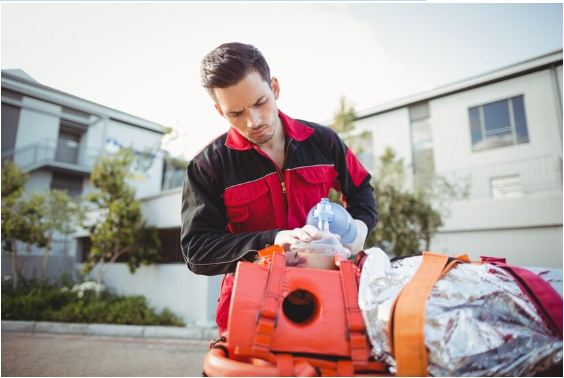
Paramedic: Is it Difficult to Learn?
Becoming a paramedic is not for the faint of heart. It takes courage, patience, and dedication to learn the necessary skills to save lives in emergencies. However, many people might wonder if becoming a paramedic is truly difficult or just perceived as such due to its intense nature. This question has sparked numerous debates among aspiring medical professionals and those curious about the field. In this blog post, we will delve into the various aspects of learning how to become a paramedic and uncover the truth behind its difficulty level. So buckle up and get ready for an insightful journey into the world of emergency medicine!
The importance of being a paramedic in our society
Becoming a paramedic is an essential career in our society. These healthcare professionals are on the front lines of emergencies and provide life-saving care to those in need. But how does one become a paramedic in the UK? The process requires extensive training and education, including completing a paramedic science degree or diploma program. Once you have completed your training, you must register with the Health and Care Professions Council (HCPC) before you can begin practicing as a paramedic. It is a challenging path, but the rewards of saving lives and helping others during times of crisis are immeasurable. Paramedics play a vital role in our society, and their importance cannot be overstated. Learn essential Steps on How to Become a Paramedic in the UK.
Demystifying the perception that becoming a paramedic is difficult
Becoming a paramedic is no easy feat, but it’s certainly not impossible. Despite the misconceptions, anyone with perseverance and dedication can become a paramedic. While there are some challenges involved in this career path, such as the stringent training requirements and high-pressure situations, the rewards far outweigh the challenges. Paramedics are on the front lines of saving lives and making a difference in their communities. By learning essential medical skills and staying calm under pressure, paramedics have the opportunity to help people during some of their most vulnerable moments. So, if you have a passion for helping others and a willingness to work hard, don’t let the notion that becoming a paramedic is difficult hold you back. You have what it takes to join the ranks of these life-saving heroes.

Understanding the training process and curriculum of becoming a paramedic
Becoming a paramedic is a challenging feat, as it involves a rigorous training process and a comprehensive curriculum. The training process typically includes classroom lectures, hands-on experience, and clinical placements, all aimed at preparing individuals for any emergency. The curriculum covers a broad range of topics, such as anatomy, physiology, emergency pharmacology, medical procedures, and patient assessment. These courses equip paramedics with the knowledge and skills necessary to assess, diagnose, and treat patients in critical situations quickly. It is a challenging and rewarding career that requires individuals to be physically and mentally fit and committed to helping people in need. By understanding the training process and curriculum, prospective paramedics can prepare themselves mentally and emotionally for the demands of the job and be better equipped to serve their community.
Tips for staying motivated and focused during paramedic training
Paramedic training can be grueling and overwhelming at times, requiring a great deal of dedication and motivation to make it to the finish line. To stay focused and driven, it is important to set realistic goals and break up your study sessions into manageable chunks. Celebrating small successes along the way can also boost your morale and keep you motivated. Additionally, finding a study partner or joining a study group can provide accountability and support when you need it most. Remember to prioritize self-care, such as taking breaks to relax and exercise to prevent burnout and stay fresh. By adopting these tips, you can maintain your momentum and push through the challenges of your training with confidence.
The diverse skills and knowledge gained through paramedic training
Paramedic training provides individuals with a diverse range of skills and knowledge that are essential in emergencies. Students learn how to assess patients and provide them with the necessary treatment on the spot, making split-second decisions that can mean the difference between life and death. In addition to basic medical knowledge, paramedic training teaches students communication techniques to help them connect with patients and their families during times of high stress. It also provides valuable instruction in trauma management, patient transport protocols, and equipment handling, ensuring that students are well-equipped to handle emergencies in a variety of settings. The skills and knowledge gained through paramedic training, therefore, not only prepare individuals for their vital role in emergency medicine but also provide them with a foundation of practical, life-saving skills that extend beyond their professional careers.

Conclusion
Becoming a paramedic is about more than just learning how to save lives. It’s about being a compassionate and dedicated hero who serves their community with courage and selflessness. In this post, we have discussed the importance of being a paramedic, debunked misconceptions about the difficulty of training, explored the different pathways to certification, and heard inspiring stories from experienced paramedics. The journey to become a paramedic may have its challenges, but it is undeniably rewarding. If you are passionate about making a difference in people’s lives and are willing to put in the hard work, then don’t let anything stop you from pursuing your dream of becoming a certified paramedic. Remember, it only takes one person – one moment – one act of bravery to change someone’s life forever. And that could be you.






